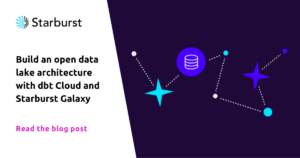According to IEEE Spectrum, SQL is the programming language everyone needs to know. Luckily, SQL is an easy language to learn. However, a drawback to learning SQL is the difficulty in finding an environment in which to practice.
That’s why learning more about SQL using Starburst Galaxy is powerful. You can quickly and easily create a free Starburst Galaxy account and start learning right away. Let’s learn a bit more about SQL and then dive into some hands-on exercises.
Is SQL difficult for beginners?
The difficulty level of learning SQL for beginners can vary depending on the individual’s programming background and prior experience with databases. For those with a programming background, SQL may seem straightforward and relatively easy to grasp, while those without a programming background might find it challenging initially.
However, compared to many other programming languages, SQL is often considered more approachable for beginners. If you’re new to programming and want to start by working with databases and querying data, SQL might be more straightforward to learn.
Related reading: Starburst data analytics certification and training
What is the purpose of SQL?
As databases become more prevalent, SQL has emerged as the principal query language for efficiently accessing and handling data stored within them, especially in relational databases where data is organized in table structures with rows and columns.
Databases form the bedrock of numerous enterprise applications, making SQL proficiency essential for businesses and professionals alike. Mastering SQL enables and empowers data professionals to interact seamlessly with vast amounts of data, retrieve specific information, and manipulate data. This skill is especially critical at a time when data-driven organizations are striving to make informed decisions as a way to reduce costs and optimize productivity.
Which is easier, Python or SQL? What is the difference between SQL and Python?
The ease of learning Python or SQL can vary depending on an individual’s background and learning preference
The differences:
| SQL | Python | |
| Use | SQL is primarily used for tasks related to database management, data manipulation (SELECT, INSERT, UPDATE, DELETE), data definition (CREATE, ALTER, DROP), and data control (GRANT, REVOKE). | Python is a general-purpose programming language used for a wide range of tasks, including web development, data analysis, scripting, automation, and more. |
| Approach | SQL is primarily a declarative language for database operations. | Python is a multi-paradigm language that supports procedural, object-oriented, and functional programming styles. |
| Application | SQL is specifically used for database-related tasks, such as managing data, querying databases, and defining database structures. | Python is used for a wide range of applications, from building web applications to data analysis, machine learning, and scientific computing. |
Join Starburst Academy and learn basic SQL for free
This lesson introduced you to the basics of SQL, including SELECT, WHERE, ORDER BY, GROUP BY, and various aggregate functions. There is still plenty to explore!
Join Starburst Academy to register for the complete class and learn about a very important topic in SQL – joining tables. It’s free!








